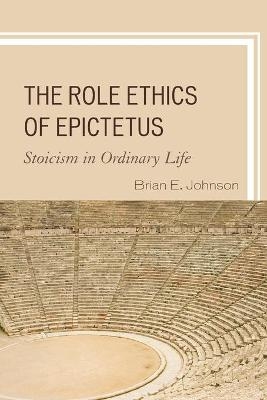
The Role Ethics of Epictetus
Stoicism in Ordinary Life
Seiten
2016
Lexington Books (Verlag)
978-1-4985-5083-3 (ISBN)
Lexington Books (Verlag)
978-1-4985-5083-3 (ISBN)
The Role Ethics of Epictetus: Stoicism in Ordinary Life offers an original interpretation of Epictetus’s ethics and how he bases his ethics on an appeal to our roles in life. Epictetus's role theory is a complete ethical theory, one that has been both misunderstood and under-appreciated in the literature.
The Role Ethics of Epictetus: Stoicism in Ordinary Life offers an original interpretation of Epictetus’s ethics and how he bases his ethics on an appeal to our roles in life. Epictetus believes that every individual is the bearer of many roles from sibling to citizen and that individuals are morally good if they fulfill the obligations associated with these roles. To understand Epictetus’s account of roles, scholars have often mistakenly looked backwards to Cicero’s earlier and more schematic account of roles. However, for Cicero, roles are merely a tool in the service of the virtue of decorum where decorum is one of the four canonical virtues—prudence, justice, greatness of spirit, and decorum. In contrast, Epictetus sets those virtues aside and offers roles as a complete ethical theory that does the work of those canonical virtues.
This book elucidates the unique features of Epictetus’s role based ethics. First, individuals have many roles and these roles are substantial enough that they may conflict. Second, although Epictetus is often taken to have only a sparse theory of appropriate action (or “duty” in older translations), Brian E. Johnson examines the criteria by which appropriate action is measured in order to demonstrate that Epictetus does have an account of appropriate action and that it is grounded in his account of roles. Finally, Epictetus downplays the Stoic ideal of the sage and replaces that figure with role-bound individuals who are supposed to inspire each of us to meet the challenges of our own roles. Instead of looking to sages, who have a perfect knowledge and action that we must imitate, Epictetus’s new ethical heroes are those we do not imitate in terms of knowledge or action, but simply in the way they approach the challenges of their roles.
The analysis found in The Role Ethics of Epictetus will be of great value both to students and scholars of ancient philosophy, ethics and moral philosophy, history, classics, and theology, and to the educated reader who admires Epictetus.
The Role Ethics of Epictetus: Stoicism in Ordinary Life offers an original interpretation of Epictetus’s ethics and how he bases his ethics on an appeal to our roles in life. Epictetus believes that every individual is the bearer of many roles from sibling to citizen and that individuals are morally good if they fulfill the obligations associated with these roles. To understand Epictetus’s account of roles, scholars have often mistakenly looked backwards to Cicero’s earlier and more schematic account of roles. However, for Cicero, roles are merely a tool in the service of the virtue of decorum where decorum is one of the four canonical virtues—prudence, justice, greatness of spirit, and decorum. In contrast, Epictetus sets those virtues aside and offers roles as a complete ethical theory that does the work of those canonical virtues.
This book elucidates the unique features of Epictetus’s role based ethics. First, individuals have many roles and these roles are substantial enough that they may conflict. Second, although Epictetus is often taken to have only a sparse theory of appropriate action (or “duty” in older translations), Brian E. Johnson examines the criteria by which appropriate action is measured in order to demonstrate that Epictetus does have an account of appropriate action and that it is grounded in his account of roles. Finally, Epictetus downplays the Stoic ideal of the sage and replaces that figure with role-bound individuals who are supposed to inspire each of us to meet the challenges of our own roles. Instead of looking to sages, who have a perfect knowledge and action that we must imitate, Epictetus’s new ethical heroes are those we do not imitate in terms of knowledge or action, but simply in the way they approach the challenges of their roles.
The analysis found in The Role Ethics of Epictetus will be of great value both to students and scholars of ancient philosophy, ethics and moral philosophy, history, classics, and theology, and to the educated reader who admires Epictetus.
Brian E. Johnson is assistant professor of philosophy at Fordham University.
Preface
Acknowledgments
Introduction
Chapter 1: Epictetus’s Role for Human Beings
Chapter 2: Bearing Many Roles: Specific Roles in an Individual’s Life
Chapter 3: Roles in Action: Appropriate Acts (or “Duties”)
Chapter 4: Education and the Good of Epictetean Roles
Chapter 5: The Cases of Socrates and Heracles: Role Conflict and Identity
Chapter 6: The Role of roles in Epictetus’s Discourses 1.2: Three Interpretations
Chapter 7: Resolving Role Conflicts
Chapter 8: Cicero’s Account of Panaetius’s Four Personae: A Theory of Decorum
Chapter 9: Epictetus’s Role Ethics—The Unfolding Script
Bibliography
| Erscheinungsdatum | 27.11.2016 |
|---|---|
| Verlagsort | Lanham, MD |
| Sprache | englisch |
| Maße | 151 x 230 mm |
| Gewicht | 322 g |
| Themenwelt | Geisteswissenschaften ► Philosophie ► Ethik |
| Geisteswissenschaften ► Philosophie ► Philosophie Altertum / Antike | |
| ISBN-10 | 1-4985-5083-5 / 1498550835 |
| ISBN-13 | 978-1-4985-5083-3 / 9781498550833 |
| Zustand | Neuware |
| Haben Sie eine Frage zum Produkt? |
Mehr entdecken
aus dem Bereich
aus dem Bereich


